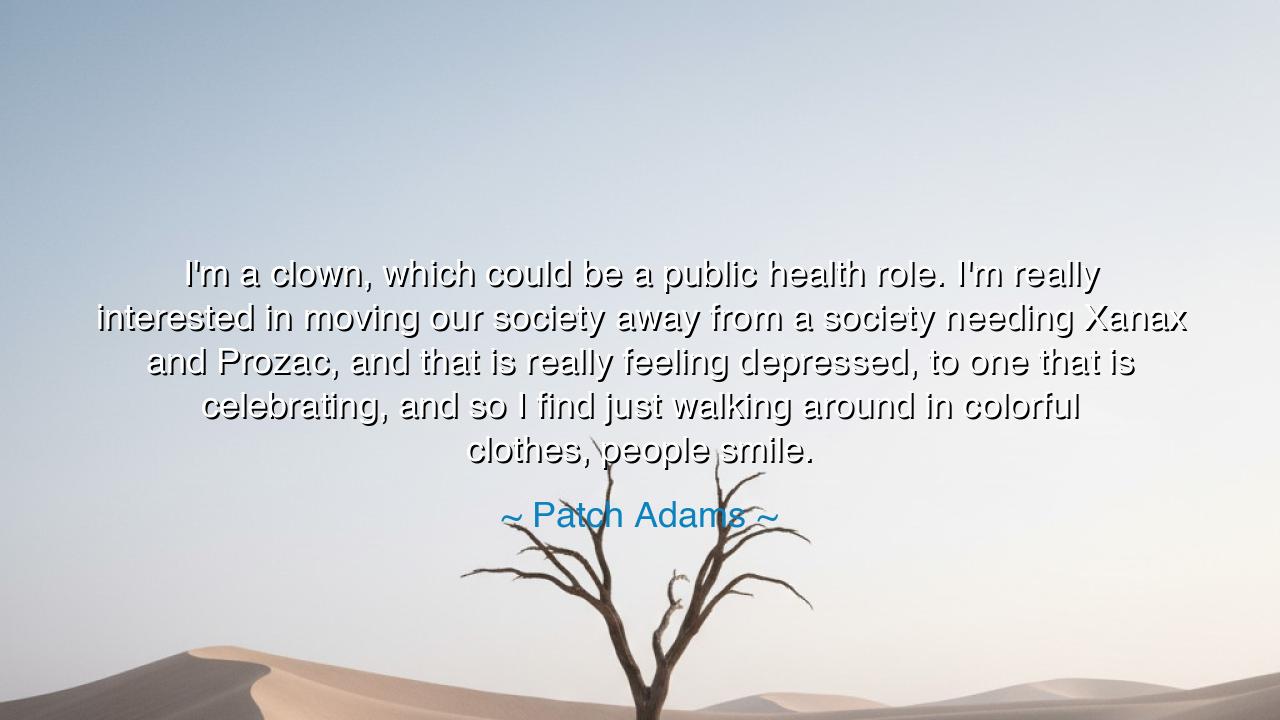
I'm a clown, which could be a public health role. I'm really
I'm a clown, which could be a public health role. I'm really interested in moving our society away from a society needing Xanax and Prozac, and that is really feeling depressed, to one that is celebrating, and so I find just walking around in colorful clothes, people smile.






The words of Patch Adams ring with both humor and prophecy: “I'm a clown, which could be a public health role. I'm really interested in moving our society away from a society needing Xanax and Prozac, and that is really feeling depressed, to one that is celebrating, and so I find just walking around in colorful clothes, people smile.” What seems at first a jest carries a truth as old as the human soul: that joy itself can be medicine, and that the simple gift of a smile can heal wounds that no pill can touch.
The meaning here lies in the recognition that celebration is a form of health. Adams reminds us that a society drowning in sorrow, dulled by chemicals, and numbed by despair, does not need only doctors of the body—it needs doctors of the spirit. The clown, long dismissed as frivolous, becomes here a healer, for his colors and antics stir laughter, break heaviness, and awaken the forgotten child within us all. In his work, we see that healing is not only found in surgery or tablets, but also in delight, in connection, in shared humanity.
The ancients knew this well. The Greeks worshipped Dionysus, not only as god of wine but as bringer of ecstasy, of release, of joy that unshackles the spirit from its chains. In festivals, laughter and dance were not distractions but sacred rites, meant to restore balance to lives burdened by toil. The jesters of medieval courts, too, spoke truths under the veil of humor, easing the burdens of kings. In every age, those who carried laughter carried also the gift of healing. Patch Adams simply reclaims this ancient office for the modern world.
His story proves the truth of his words. Adams, a physician by training, chose to don the garb of a clown, walking hospital halls not with a stethoscope alone but with a red nose and bright clothes. Children, once afraid of sterile rooms and painful treatments, found themselves laughing; even weary adults lifted their eyes from despair. What medicine could not ease, laughter often could. And here we see that his philosophy is not mere whimsy, but living testimony: joy is a form of public health, and every smile is a seed of resilience.
The origin of this teaching comes from the heart of compassion itself. Adams recognized that much of human suffering does not arise from disease alone, but from loneliness, alienation, and hopelessness. Pills may dull pain, but they cannot awaken the will to live. Laughter, however, binds us to one another, reminding us that we are not alone. His colorful clothes are more than costume—they are banners of defiance against despair, proclaiming that life, despite sorrow, is worth celebrating.
The lesson here is urgent: we must not underestimate the healing power of joy. If a clown’s simple act of wearing bright colors can lighten the hearts of strangers, then what more can be done if we each make small efforts to spread joy where we are? In practice, this means choosing to smile at others, to dress with color and life rather than always in grey, to bring humor into heavy spaces, to listen with warmth, and to refuse to let despair be the only voice.
For in truth, every one of us can be a kind of healer. We may not all be doctors, but we can be bringers of laughter, of kindness, of moments that make another’s burden lighter. Do not wait until someone is drowning to throw them a rope—offer a smile, a joke, a gesture of celebration before sorrow consumes them. These are not small acts. They are acts of public health, no less vital than medicines and machines.
So let the teaching of Patch Adams endure: to heal is not only to treat disease but to awaken joy. Be a clown in your own way. Walk boldly in colors, speak words that bring laughter, let your presence be a balm to the weary. For society will always have its shadows, but if we choose to celebrate, if we choose to spread smiles, then together we build a world where healing is not the privilege of a few, but the song of all.






AAdministratorAdministrator
Welcome, honored guests. Please leave a comment, we will respond soon